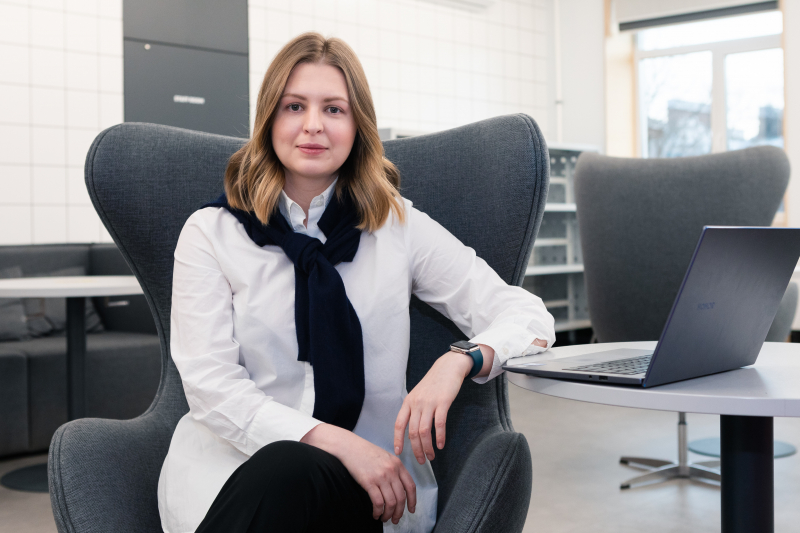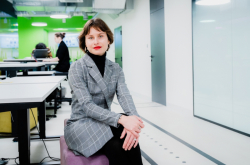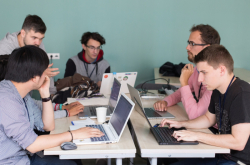Mutually beneficial collaboration
According to most recent data, the market for product design has been skyrocketing over the past several years. These days, to be a successful product designer, you need to combine knowledge of UX and UI, thus being able to develop digital products’ architecture based on user experience, as well as create the visuals of an app or website.
ITMO’s new Master’s program in product design was created to meet the high demand for product designers. The program’s main goal is to train Middle+ specialists, who will be able to seamlessly fit into a company, build upon its development strategy, taking into account the current indicators, as well as work in a team responsible for development and support of digital products.
Netology, a major Russian EdTech company, joined the Master’s program as a partner to ensure that its graduates are indeed in-demand and versed in business processes. Apart from contributing its substantial expertise in certified online courses, Netology provided its connections to top experts and leading Russian companies, who are ready to provide real-world cases to the program’s students. Moreover, graduates will be able to land jobs at partner companies upon completing the program.
“Netology is a partner and guide for those seeking to achieve their professional goals with education. At the Higher Education department, we help our students get diplomas that will turn into the next step in their careers. That’s why we base our programs on demands of potential employers and make them practice-oriented. We share this approach with our partners from ITMO. As a result, together, we deliver educational programs that combine a strong academic foundation with practical training “at your fingertips” provided by experts and industrial partners, which allows students to explore the market and their trade from the inside. Upon graduation, our students turn into sought-after specialists,” explains Oksana Aprelskaya, deputy head of the Higher Education department at Netology.
According to the head of the program and ITMO’s Digital Humanities Center Antonina Puchkovskaia, this collaboration with Netology is a step towards the new goals of ITMO University as a research and educational corporation: improving the flow of business processes, learning to quickly develop or adapt educational programs, and working in bigger teams. The EdTech partner benefits from this collaboration in getting new target audiences and boosting its brand and reputation.
“This partnership brings together an academic institution and a top player on the Russian EdTech market, which made its name on short-term certified educational programs. We see this combination of their business aptitude and experience in product design with our fundamental education and academic experience as a prerequisite for great results achieved in this online Master’s program,” shares Antonina Puchkovskaia.

Antonina Puchkovskaia. Credit: Dmitry Grigoryev, ITMO.NEWS
A longer training of higher quality
So far, it is not a common practice for universities to collaborate with EdTech companies, however the new program in product design stands out from existing collaborations. Here, students will be trained to perform the whole cycle of real-life tasks: from compiling a design specification, identifying hypotheses, designing user scripts, and conducting research to team management and design of mobile apps, websites, and design systems. This deeper understanding of the process, says Antonina Puchkovskaia, is enabled by a longer training period than that typical for online courses.
“Our expertise in education allows us to develop a balanced and versatile curriculum. We offer a comprehensive product that will help students go all the way from an idea to its implementation. All of this is possible thanks to the two-year learning period, over the course of which students can connect to a wide selection of experts, build their individual learning track, and create a strong portfolio with cases from such clients as Ozon, Alfa Bank, MegaFon, and others,” adds Antonina Puchkovskaia.
An individual learning track
Half of the program’s modules is delivered by ITMO’s lecturers and the other half – by experts from Netology. This way, says Antonina Puchkovskaia, students will never get bored, while also receiving high-quality education.
A total of 31 students enrolled in the program this year. All of them will be able to create their own individual learning tracks from the 19 courses available on the Netology platform (in Russian). Eleven topics make the compulsory part of the program, and students can additionally opt to learn interface animation, prototyping, visual thinking, and other courses. Students will also be able to discuss their cases with lecturers in real time on webinars, as well as receive CV consultations from external experts.
As for graduation projects, they can be defended both by individual students and teams. The project’s topic can be one of the cases analyzed during practical training – together with their curators, students will complete the case, turning it into a full-scale dissertation.
Students will graduate from the program as specialists capable of analyzing user experience and designing user interaction with a product or service; developing user-friendly interfaces and writing graspable texts, as well as managing teams and compiling recommendations for improvements in digital products and services.
Graduates will be able to work as product, UX, UI, or web designers, Tilda designers, as well as UX/CX researchers and usability specialists at the partner companies of both ITMO and Netology.
New cases and partners
In the future, the organizers are planning to expand the program’s partners and cases. For instance, one of the plans is to develop digital products for Gazprom Neft and the new industrial center created at ITMO in partnership with the company. Another possible direction is updating ITMO’s services, including the my.itmo app, the admissions webpage, and the Learning Analytics project. Moreover, the organizers will adapt the curriculum and the number of livestream webinars based on students’ feedback.





